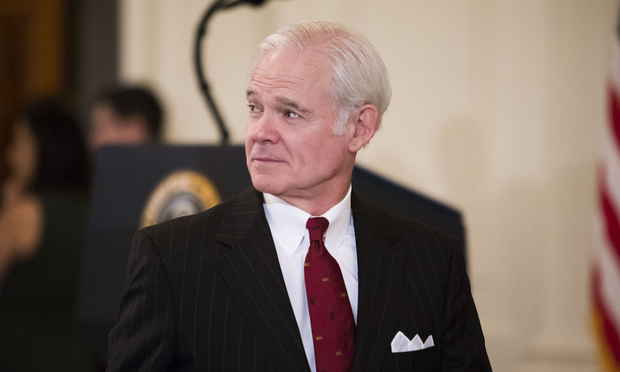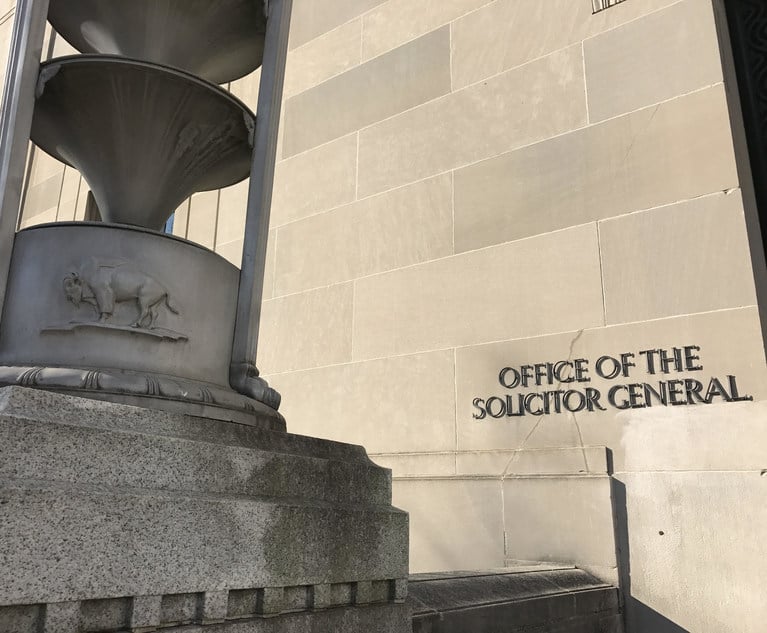Roberts Rebuffs Rand Paul, Refusing to Read Impeachment Question 'As Submitted'
Chief Justice John Roberts Jr. said Thursday, after receiving a question from Republican Sen. Rand Paul of Kentucky: "The presiding officer declines to read the question as submitted."
January 30, 2020 at 02:05 PM
5 minute read
 U.S. Supreme Court Chief Justice John G. Roberts arrives at the U.S. Capitol on Jan. 16. (Photo: Diego M. Radzinschi/ ALM)
U.S. Supreme Court Chief Justice John G. Roberts arrives at the U.S. Capitol on Jan. 16. (Photo: Diego M. Radzinschi/ ALM)
Chief Justice John Roberts Jr. on Thursday refused to read aloud a question from Kentucky Republican Sen. Rand Paul that was widely reported as including the name of the anonymous whistleblower who first raised alarms over the Trump administration's interaction with Ukraine.
Paul reportedly wanted to ask a question that explored the origins of the U.S. House's investigation of President Donald Trump's withholding of funds from the Ukraine allegedly in return for an announcement that Ukraine was investigating former Vice President Joseph Biden and his son Hunter, who was serving on the board of a Ukraine corporation.
Roberts, according to a Politico report on Wednesday night, had "communicated to senators that he will not read aloud the alleged Ukraine whistleblower's name." Roberts said Thursday, after receiving a question from Paul: "The presiding officer declines to read the question as submitted."
WATCH: Chief Justice John Roberts again declined to read a question from Sen. Rand Paul. https://t.co/eqwzSvsmSc
— Axios (@axios) January 30, 2020
Paul left the chambers on Thursday after Roberts refused to read the question, which reportedly did name the individual who has been identified in some media reports as the possible whistleblower. Paul on Thursday afternoon tweeted his question and the reasons he wanted to ask it.
House managers have refused to identify the whistleblower, arguing his identity is irrelevant to the proceedings. Senate Republicans also reportedly were not in favor of exposing the whistleblower during the impeachment trial. Sen. Charles Grassley, R-Iowa, long a supporter of whistleblower rights, has been the leading Senate proponent of legislation protecting whistleblowers.
Roberts has read aloud dozens of questions addressing a range of issues, including the standard for conviction, Roberts' own powers as presiding officer to issue subpoenas or make evidentiary rulings and the legality of House-issued subpoenas. On Wednesday, he read aloud part of the infamous "Access Hollywood" tape on which Trump said about touching women without their consent: "When you're a star, they let you do it—you can do anything."
Roberts' decision to reject the whistleblower-related question was his first substantive decision during the proceedings. Earlier in the week, he admonished lawyers for both sides to watch their language and remember "where they are."
"I think it is appropriate at this point for me to admonish both the House managers and the president's counsel in equal terms to remember that they are addressing the world's greatest deliberative body," Roberts said.
But he may face a much more difficult decision on Friday, when the Senate is expected to debate—and vote on—whether to call witnesses, including John Bolton, the former national security adviser who has said he would speak about Ukraine matters, if subpoenaed.
A draft manuscript by Bolton, represented by Charles Cooper of Washington's Cooper & Kirk, reportedly says Trump directly told him he was withholding military assistance to Ukraine in order to get that nation's new president to announce an investigation of the Bidens.
Trump has raised the possibility of asserting executive privilege to block any testimony from Bolton. The National Security Council, in a prereview of the Bolton manuscript, reportedly told Cooper that the book contains a large amount of classified material. Cooper has denied that assessment.
 Charles Cooper, of Cooper & Kirk at the White House last year. (Photo: Diego M. Radzinschi / ALM)
Charles Cooper, of Cooper & Kirk at the White House last year. (Photo: Diego M. Radzinschi / ALM)If any Senate witness vote ends in a tie, Roberts may be asked to break it. Legal scholars are divided over whether Senate rules permit Roberts to cast such a vote. The chief justice could simply decide not to cast the tie-breaking vote, which means the motion to call witnesses would fail on a 50-50 vote.
Chief Justice William Rehnquist, who presided over the impeachment trial of President Bill Clinton, did not face any tie votes. The final Senate vote on the second article of impeachment against Clinton was 50-50, and that article failed.
In the only other impeachment trial—of President Andrew Johnson—then-Chief Justice Salmon Chase did vote to break two ties, but the Senate changed its impeachment rules after that event.
Read more:
'Complete Nonsense': Scholars Denounce Dershowitz's Trump Trial Arguments
What Could a Legal Fight Over John Bolton's New Book Look Like?
Roberts Admonishes Impeachment Lawyers to 'Remember Where They Are'
What Rehnquist Told Senators After 'Culture Shock' of Presiding at Clinton's Trial
House Throws Ken Starr's Words Back at Trump in Tax Returns Fight
For One Roberts Clerk, Trump's Impeachment Trial Will Be Part of Experience
This content has been archived. It is available through our partners, LexisNexis® and Bloomberg Law.
To view this content, please continue to their sites.
Not a Lexis Subscriber?
Subscribe Now
Not a Bloomberg Law Subscriber?
Subscribe Now
NOT FOR REPRINT
© 2025 ALM Global, LLC, All Rights Reserved. Request academic re-use from www.copyright.com. All other uses, submit a request to [email protected]. For more information visit Asset & Logo Licensing.
You Might Like
View All

Trump's DOJ Withdraws Opposition to Law Banning Trans Care for Minors

Judge Grills DOJ on Trump’s Birthright Citizenship Executive Order

Judge Accuses Trump of Constitutional End Run, Blocks Citizenship Order
3 minute readTrending Stories
- 1Ex-Starbucks GC Exiting Latest Role, Will Get Severance
- 2Family Law Special Section 2025
- 3We Must Uphold the Rights of Immigrant Students
- 4Orrick Picks Up 13-Lawyer Tech, VC Group From Gunderson Dettmer
- 5How Alzheimer’s and Other Cognitive Diseases Affect Guardianship, POAs and Estate Planning
Who Got The Work
J. Brugh Lower of Gibbons has entered an appearance for industrial equipment supplier Devco Corporation in a pending trademark infringement lawsuit. The suit, accusing the defendant of selling knock-off Graco products, was filed Dec. 18 in New Jersey District Court by Rivkin Radler on behalf of Graco Inc. and Graco Minnesota. The case, assigned to U.S. District Judge Zahid N. Quraishi, is 3:24-cv-11294, Graco Inc. et al v. Devco Corporation.
Who Got The Work
Rebecca Maller-Stein and Kent A. Yalowitz of Arnold & Porter Kaye Scholer have entered their appearances for Hanaco Venture Capital and its executives, Lior Prosor and David Frankel, in a pending securities lawsuit. The action, filed on Dec. 24 in New York Southern District Court by Zell, Aron & Co. on behalf of Goldeneye Advisors, accuses the defendants of negligently and fraudulently managing the plaintiff's $1 million investment. The case, assigned to U.S. District Judge Vernon S. Broderick, is 1:24-cv-09918, Goldeneye Advisors, LLC v. Hanaco Venture Capital, Ltd. et al.
Who Got The Work
Attorneys from A&O Shearman has stepped in as defense counsel for Toronto-Dominion Bank and other defendants in a pending securities class action. The suit, filed Dec. 11 in New York Southern District Court by Bleichmar Fonti & Auld, accuses the defendants of concealing the bank's 'pervasive' deficiencies in regards to its compliance with the Bank Secrecy Act and the quality of its anti-money laundering controls. The case, assigned to U.S. District Judge Arun Subramanian, is 1:24-cv-09445, Gonzalez v. The Toronto-Dominion Bank et al.
Who Got The Work
Crown Castle International, a Pennsylvania company providing shared communications infrastructure, has turned to Luke D. Wolf of Gordon Rees Scully Mansukhani to fend off a pending breach-of-contract lawsuit. The court action, filed Nov. 25 in Michigan Eastern District Court by Hooper Hathaway PC on behalf of The Town Residences LLC, accuses Crown Castle of failing to transfer approximately $30,000 in utility payments from T-Mobile in breach of a roof-top lease and assignment agreement. The case, assigned to U.S. District Judge Susan K. Declercq, is 2:24-cv-13131, The Town Residences LLC v. T-Mobile US, Inc. et al.
Who Got The Work
Wilfred P. Coronato and Daniel M. Schwartz of McCarter & English have stepped in as defense counsel to Electrolux Home Products Inc. in a pending product liability lawsuit. The court action, filed Nov. 26 in New York Eastern District Court by Poulos Lopiccolo PC and Nagel Rice LLP on behalf of David Stern, alleges that the defendant's refrigerators’ drawers and shelving repeatedly break and fall apart within months after purchase. The case, assigned to U.S. District Judge Joan M. Azrack, is 2:24-cv-08204, Stern v. Electrolux Home Products, Inc.
Featured Firms
Law Offices of Gary Martin Hays & Associates, P.C.
(470) 294-1674
Law Offices of Mark E. Salomone
(857) 444-6468
Smith & Hassler
(713) 739-1250








